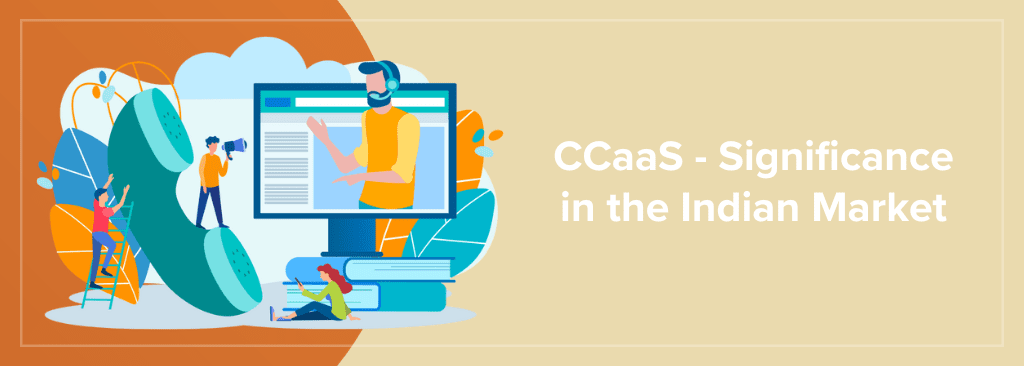Contact Center as a Service (CCaaS) – Its Significance in the Indian Market
In the Indian context, organizations have been sourcing contact center software, voice, and cloud separately from different vendors. This means higher capital and time investments.
We are talking about an 8000 crore market opportunity for contact centers in the Indian market.
Let us take a moment to look at some of the key challenges of procuring different components from different vendors:
6 Key Challenges of Sourcing Contact Center Solutions Separately
Integration Complexity
Integrating software, voice, and cloud from different vendors can be complex and time-consuming. Ensuring they work seamlessly together would mean custom development and extensive technical expertise.
This takes away your focus from your core business.
Compatibility Challenges
Different vendors may use varying technologies, protocols, and standards. Ensuring compatibility and interoperability between these components can be a significant challenge, potentially leading to technical glitches and disruptions.
Increased Cost
Sourcing from different vendors can lead to higher costs due to licensing fees, additional support contracts, and the need for more resources to manage and integrate the various components. You might also need to hire experts in each area.
Redundancy and Vendor Management
As an organization, you would obviously want some redundancy built into your customer experience infrastructure. This would double your existing challenges in terms of relationships to manage.
You will have to factor in issues like negotiating contracts, resolving disputes, and coordinating support and maintenance, which can drain resources and time.
If something goes wrong, you know the drill, right? Everyone will point the finger at the other, making your life miserable. This can result in subpar quality of service, impacting the customer experience.
Security and Compliance
Ensuring consistent security and compliance across different components can be challenging. Each vendor may have its own security measures and compliance standards, making it more challenging to maintain a unified security and compliance strategy.
Scalability Issues
Scaling the contact center can be more complicated when using separate vendors. Coordinating expansion plans, adjusting licenses, and ensuring the entire system scales effectively can be a headache.
What Do You Do to Address These Challenges?
You opt for a vendor who can provide all of these together in an integrated manner. This can simplify management, reduce integration complexities, and improve overall system reliability and performance.
This is what you call, Contact Center as a Service (CCaaS).
How CCaaS Simplifies Contact Center Sourcing Challenges?
CCaaS, as the name implies, provides contact center features as a service. It integrates dialers, telephony, cloud, integrations, and customizations as a part of the offering. All at a per-minute pricing.
However, when you choose your CCaaS provider, you have to ensure the following:
- Is your CCaaS provider willing to offer integrations with other systems like CRM and in-house applications? Do they already have in-built integrations with industry-leading CRMs and helpdesk solutions?
- You may follow a specific workflow in your customer experience function. Is your CCaaS provider willing to customer the workflow per your needs and also add additional customizations before you begin using the platform? Are they willing to throw in these customizations as a part of the implementation? Or are they charging you additionally for this? If so, how much are they charging?
- Does your CCaaS provider offer intelligent routing capabilities: skill-based, location-based, time-based, or customer behavior-based routing?
- I am sure you would want to scale up and down your agents based on your business needs. Check with your CCaaS provider how easy or difficult it is to scale up and down your agents. Do you have to buy additional licenses? Do you have to wait a certain amount of time before you can onboard additional agents to the platform?
- How does your CCaaS provider charge for the subscription? Is it pay-as-you-go, or are there any fixed components? Do they expect you to sign a contract with minimum commitments in terms of revenue or the number of licenses?
- Is your CCaaS provider compliant with industry standards and regulations like HIPAA, PCI-DSS, TCPA, FDCPA, Reg-F, SOC2, FedRamp, and ISAE 3402 Type II specifications?
- How does your CCaaS provider ensure the availability of your data? Do they provide redundancy and automatic failover? Do they ensure availability even during natural calamities and disasters? Do they handle patching and operating system-level vulnerabilities?
- How many channels does your CCaaS provider offer? Are they all integrated? Does your CCaaS provider provide a single view of your customers across channels and interfaces?
Answering these questions would provide enough information to decide and choose a CCaaS provider for your needs.
CCaaS is the way to go forward. This is what we have been advising our customers for more than 20 years now. We are currently seeing a lot of traction for our CCaaS offerings.
What kind of CCaaS provider you are signing up for is very important.
Ensure you check out the platform for a few days before signing up with anyone. This would allow you to make an informed decision about migrating your customer experience function to a new platform.
